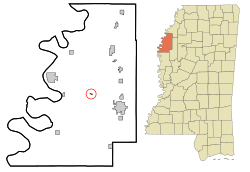Pace, Mississippi
Pace, Mississippi | |
|---|---|
 | |
 Location of Pace, Mississippi | |
| Coordinates: 33°47′30″N 90°51′30″W / 33.79167°N 90.85833°W | |
| Country | United States |
| State | Mississippi |
| County | Bolivar |
| Area | |
| • Total | 0.16 sq mi (0.41 km2) |
| • Land | 0.15 sq mi (0.40 km2) |
| • Water | 0.01 sq mi (0.02 km2) |
| Elevation | 141 ft (43 m) |
| Population (2010) | |
| • Total | 274 |
| • Estimate (2017)[2] | 253 |
| • Density | 1,653.59/sq mi (636.83/km2) |
| Time zone | UTC-6 (Central (CST)) |
| • Summer (DST) | UTC-5 (CDT) |
| ZIP code | 38764 |
| Area code | 662 |
| FIPS code | 28-54920 |
| GNIS feature ID | 0675367 |
Pace is a town in Bolivar County, Mississippi, United States. The population was 274 at the 2010 census.[3]
The community has the name of James Henry Pace, a pioneer citizen.[4]
Geography
Pace is located at 33°47′30″N 90°51′30″W / 33.79167°N 90.85833°W (33.791797, -90.858289).[5]
According to the United States Census Bureau, the town has a total area of 0.16 square miles (0.41 km2), of which 0.0077 square miles (0.02 km2), or 3.73%, is water.[3]
Demographics
| Census | Pop. | Note | %± |
|---|---|---|---|
| 1930 | 349 | — | |
| 1940 | 426 | 22.1% | |
| 1950 | 422 | −0.9% | |
| 1960 | 420 | −0.5% | |
| 1970 | 629 | 49.8% | |
| 1980 | 519 | −17.5% | |
| 1990 | 354 | −31.8% | |
| 2000 | 364 | 2.8% | |
| 2010 | 274 | −24.7% | |
| 2017 (est.) | 253 | [2] | −7.7% |
| U.S. Decennial Census[6] | |||
As of the census[7] of 2000, there were 364 people, 129 households, and 95 families residing in the town. The population density was 2,365.3 people per square mile (936.9/km²). There were 131 housing units at an average density of 851.2 per square mile (337.2/km²). The racial makeup of the town was 13.74% White, 82.69% African American, 1.10% Native American, 1.65% Asian, and 0.82% from two or more races. Hispanic or Latino of any race were 1.37% of the population.
There were 129 households out of which 35.7% had children under the age of 18 living with them, 41.1% were married couples living together, 30.2% had a female householder with no husband present, and 25.6% were non-families. 22.5% of all households were made up of individuals and 5.4% had someone living alone who was 65 years of age or older. The average household size was 2.82 and the average family size was 3.33.
In the town, the population was spread out with 30.2% under the age of 18, 7.7% from 18 to 24, 27.7% from 25 to 44, 22.3% from 45 to 64, and 12.1% who were 65 years of age or older. The median age was 34 years. For every 100 females, there were 82.0 males. For every 100 females age 18 and over, there were 75.2 males.
The median income for a household in the town was $24,219, and the median income for a family was $27,857. Males had a median income of $21,042 versus $17,083 for females. The per capita income for the town was $12,434. About 24.5% of families and 26.0% of the population were below the poverty line, including 36.6% of those under age 18 and 13.2% of those age 65 or over.
Education
Pace is served by the West Bolivar Consolidated School District (formerly the West Bolivar School District),[8] which operates West Bolivar High School.
Notable person
- Besmilr Brigham, poet and short story writer[9]
References
- ^ "2017 U.S. Gazetteer Files". United States Census Bureau. Retrieved Jan 6, 2019.
- ^ a b "Population and Housing Unit Estimates". Retrieved March 24, 2018.
- ^ a b "Geographic Identifiers: 2010 Demographic Profile Data (G001): Pace town, Mississippi". U.S. Census Bureau, American Factfinder. Archived from the original on February 12, 2020. Retrieved January 23, 2014.
- ^ Moyer, Armond; Moyer, Winifred (1958). The origins of unusual place-names. Keystone Pub. Associates. p. 96.
- ^ "US Gazetteer files: 2010, 2000, and 1990". United States Census Bureau. 2011-02-12. Retrieved 2011-04-23.
- ^ "Census of Population and Housing". Census.gov. Retrieved June 4, 2015.
- ^ "U.S. Census website". United States Census Bureau. Retrieved 2008-01-31.
- ^ "SCHOOL DISTRICT REFERENCE MAP (2010 CENSUS): Bolivar County, MS." U.S. Census Bureau. Retrieved on August 2, 2017. Note that the Benoit and Shaw districts have since consolidated into West Bolivar.
- ^ Janet McAdams; Geary Hobson; Kathryn Walkiewicz (9 October 2012). The People Who Stayed: Southeastern Indian Writing After Removal. University of Oklahoma Press. p. 283. ISBN 978-0-8061-8575-0.


